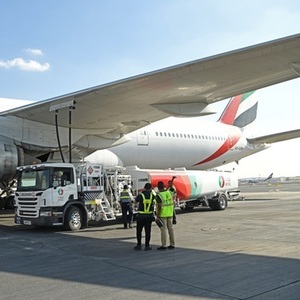Virent biobased fuel used in SAF demonstration flight

February 1, 2023
BY Marathon Petroleum Corp.
Virent’s plant-based synthesized aromatic kerosene on Jan. 30 helped power an Emirates Airline demonstration flight, the first in the Middle East and North Africa to use 100 percent sustainable aviation fuel (SAF) in one engine and traditional jet fuel in the other. Virent, a Marathon Petroleum Corp. subsidiary, used its BioForming process to produce the synthesized aromatic kerosene (SAK), a critical component that made the 100 percent SAF possible.
“Virent’s technology converts widely available, plant-based sugars into the compounds that make it possible to fuel a jet engine without the need to blend SAF with traditional jet fuel,” said Dave Kettner, president and general counsel of Virent, Inc. “Along with Marathon Petroleum Corporation, we are committed to meeting today’s energy needs while investing in an energy diverse future, and today’s flight is a great example of this commitment. We’re excited about this opportunity to work with our forward-thinking colleagues at Emirates, GE Aerospace, Boeing, Honeywell and Neste as we demonstrate that we can power sustainable aviation without modifying today’s engines or the infrastructure that serves the airline industry.”
Advertisement
Advertisement
Today’s SAF – typically made from used cooking oil or other plant-based oil feedstocks – has to be blended with petroleum products because SAF lacks a component called “aromatics,” which is required to meet today’s jet fuel specifications. Virent’s SAK, made from renewable plant sugars, provides those aromatics.
Because Virent’s SAK is made from plant-based sugars as feedstocks, the carbon impact on a lifecycle basis is less than that of petroleum-based fuels. Virent is targeting greater than 50 percent reduction in greenhouse gas emissions for SAK from a commercial project, with the potential to achieve net zero emissions using options such as renewable electricity, renewable natural gas and carbon capture and sequestration in the production of SAK. Virent has also developed data from engine testing that shows an SAF blend using its SAK is cleaner burning and has lower particulate matter emissions than conventional jet fuels.
“We share Emirates Airline’s goals of minimizing greenhouse gas emissions and scaling up the supply chain for SAF,” said Kettner. “Because SAF is a relatively new fuel technology, it’s critical that we collaborate on flights like this to bring SAF into more widespread use.”
Advertisement
Advertisement
This latest use of Virent’s technology to help power jet engines with 100 percent SAF comes after successful demonstration flights with United Airlines in December 2021 and Gulfstream in December 2022.
Related Stories
The European Commission on July 18 announced its investigation into biodiesel imports from China is now complete and did not confirm the existence of fraud. The commission will take action, however, to address some systemic weaknesses it identified.
Kintetsu World Express Inc. has signed an additional agreement with Hong Kong, China-based Cathay Pacific Airways for the use of sustainable aviation fuel (SAF). The agreement expands a three-year partnership between the two companies.
Broco Energy on July 17 announced a new partnership with the Massachusetts Port Authority (Massport) to deliver and transition Massport's fuel tanks to renewable diesel across its various facilities.
Shell Aviation, Accenture, and Amex GBT on July 10 announced Avelia is in the process of evolving to an industry solution with independent data hosting and a multi-supplier model helping users access the GHG benefits of SAF.
The U.S EPA on July 17 released data showing more than 1.9 billion RINs were generated under the RFS during June, down 11% when compared to the same month of last year. Total RIN generation for the first half of 2025 reached 11.17 billion.
Upcoming Events










